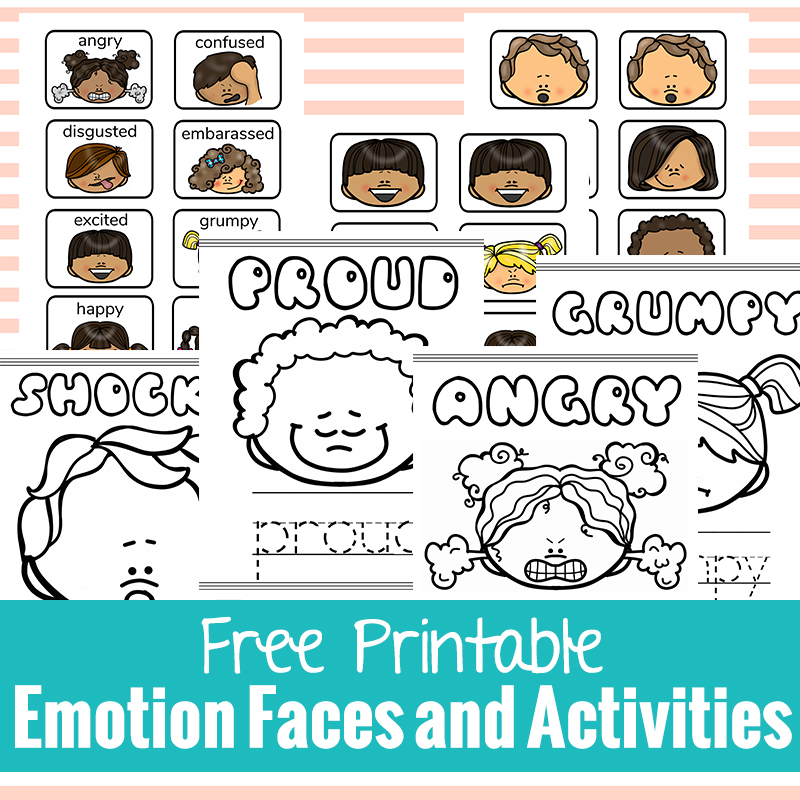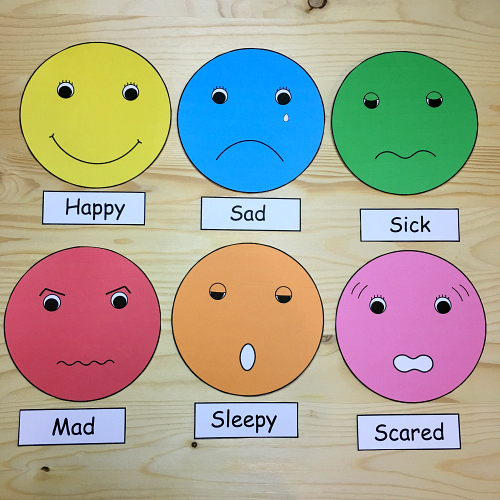Printable Emotions Faces - Use the feeling faces to help you point out and explain the different facial expressions. Select the feeling faces you want to introduce to children. Use the blank lines under each feeling to add. Teach a balance of “positive, comfortable” and “negative/uncomfortable” feelings. Therapists looking for printable emotion faces to share with young clients can use this free downloadable pdf of emotion faces for kids. Select one emotion at a time and take pictures of children making the facial expression that matches the feeling.
Use the blank lines under each feeling to add. Therapists looking for printable emotion faces to share with young clients can use this free downloadable pdf of emotion faces for kids. Use the feeling faces to help you point out and explain the different facial expressions. Teach a balance of “positive, comfortable” and “negative/uncomfortable” feelings. Select one emotion at a time and take pictures of children making the facial expression that matches the feeling. Select the feeling faces you want to introduce to children.
Use the blank lines under each feeling to add. Select one emotion at a time and take pictures of children making the facial expression that matches the feeling. Use the feeling faces to help you point out and explain the different facial expressions. Therapists looking for printable emotion faces to share with young clients can use this free downloadable pdf of emotion faces for kids. Select the feeling faces you want to introduce to children. Teach a balance of “positive, comfortable” and “negative/uncomfortable” feelings.
Free Emotion Faces and Activities Printable for Your Kids
Teach a balance of “positive, comfortable” and “negative/uncomfortable” feelings. Therapists looking for printable emotion faces to share with young clients can use this free downloadable pdf of emotion faces for kids. Use the blank lines under each feeling to add. Select one emotion at a time and take pictures of children making the facial expression that matches the feeling. Select.
Printable Emotion Faces Free
Select the feeling faces you want to introduce to children. Use the feeling faces to help you point out and explain the different facial expressions. Teach a balance of “positive, comfortable” and “negative/uncomfortable” feelings. Select one emotion at a time and take pictures of children making the facial expression that matches the feeling. Use the blank lines under each feeling.
Printable Emotion Faces Free
Select the feeling faces you want to introduce to children. Teach a balance of “positive, comfortable” and “negative/uncomfortable” feelings. Use the blank lines under each feeling to add. Therapists looking for printable emotion faces to share with young clients can use this free downloadable pdf of emotion faces for kids. Use the feeling faces to help you point out and.
Free Printable Emotion Faces and Activities Natural Beach Living
Use the blank lines under each feeling to add. Select the feeling faces you want to introduce to children. Select one emotion at a time and take pictures of children making the facial expression that matches the feeling. Use the feeling faces to help you point out and explain the different facial expressions. Therapists looking for printable emotion faces to.
Free Emotion Faces and Activities Printable for Your Kids
Teach a balance of “positive, comfortable” and “negative/uncomfortable” feelings. Therapists looking for printable emotion faces to share with young clients can use this free downloadable pdf of emotion faces for kids. Use the feeling faces to help you point out and explain the different facial expressions. Select the feeling faces you want to introduce to children. Use the blank lines.
Printable Emotion Faces For Preschool
Therapists looking for printable emotion faces to share with young clients can use this free downloadable pdf of emotion faces for kids. Use the blank lines under each feeling to add. Select the feeling faces you want to introduce to children. Select one emotion at a time and take pictures of children making the facial expression that matches the feeling..
Emotions Printables For Kids
Use the feeling faces to help you point out and explain the different facial expressions. Select the feeling faces you want to introduce to children. Select one emotion at a time and take pictures of children making the facial expression that matches the feeling. Teach a balance of “positive, comfortable” and “negative/uncomfortable” feelings. Use the blank lines under each feeling.
Printable Emotion Faces For Preschool
Use the feeling faces to help you point out and explain the different facial expressions. Therapists looking for printable emotion faces to share with young clients can use this free downloadable pdf of emotion faces for kids. Select one emotion at a time and take pictures of children making the facial expression that matches the feeling. Select the feeling faces.
Printable Feelings Chart for Kids (PDF Download)
Use the feeling faces to help you point out and explain the different facial expressions. Teach a balance of “positive, comfortable” and “negative/uncomfortable” feelings. Use the blank lines under each feeling to add. Select one emotion at a time and take pictures of children making the facial expression that matches the feeling. Select the feeling faces you want to introduce.
Printable Emotion Faces For Toddlers
Select one emotion at a time and take pictures of children making the facial expression that matches the feeling. Use the blank lines under each feeling to add. Use the feeling faces to help you point out and explain the different facial expressions. Therapists looking for printable emotion faces to share with young clients can use this free downloadable pdf.
Use The Blank Lines Under Each Feeling To Add.
Therapists looking for printable emotion faces to share with young clients can use this free downloadable pdf of emotion faces for kids. Select one emotion at a time and take pictures of children making the facial expression that matches the feeling. Use the feeling faces to help you point out and explain the different facial expressions. Teach a balance of “positive, comfortable” and “negative/uncomfortable” feelings.









